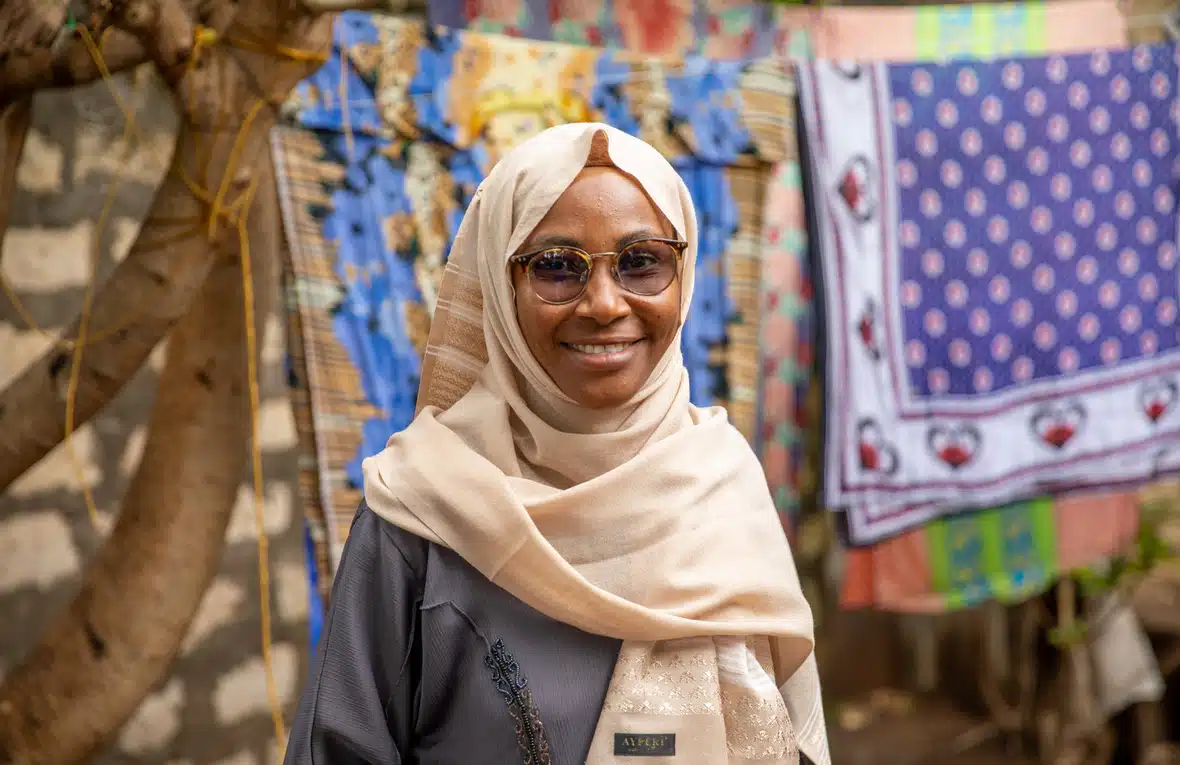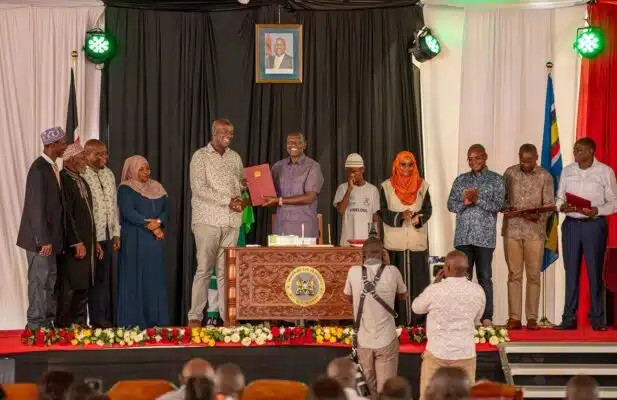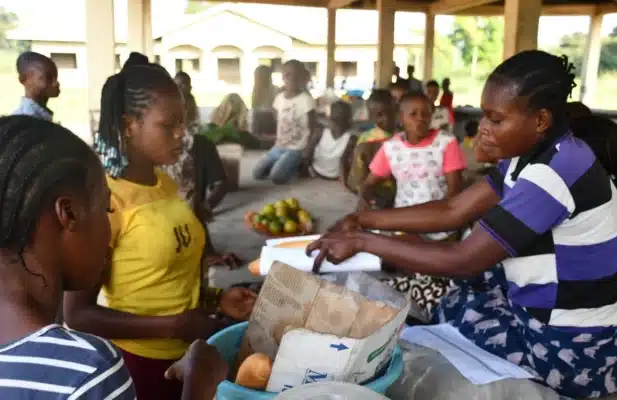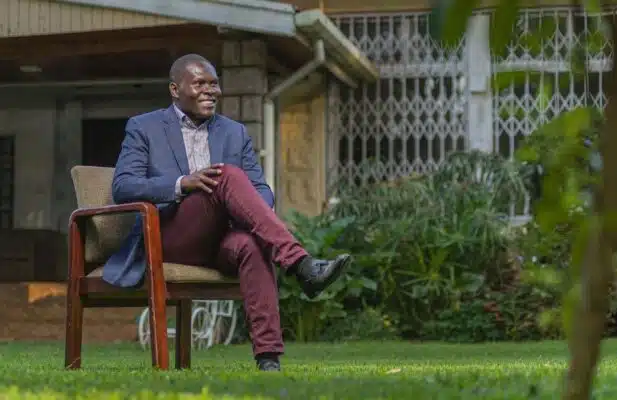
Barke Hamisi grew up stateless as part of Kenya’s Pemba community. She became a paralegal so she could help fight for the Pemba’s recognition as Kenyans. © UNHCR/Charity Nzomo
Barke Hamisi always felt she was a Kenyan, until her first encounter with the stigma of statelessness. Nearly three decades later, she can finally say, “I belong”
By Charity Nzomo in Kilifi, Kenya
A gentle breeze fans a row of colourful clothes drying on a line behind Barke Hamisi, 29, and her two younger sisters, Sharifa and Nuru, as they sit outside their stone house preparing ‘sambusas’ – a popular Swahili delicacy. They look like any regular family as they chat and laugh among themselves.
But from an early age, Barke’s life was shrouded in uncertainty because she was part of the stateless Pemba community in the southern coastal region of Kenya. Her positive outlook on life was shattered at a young age.
“I never thought I was different from the rest of my classmates until I got to Grade 3 when I would constantly be told ‘You are a Pemba’, and that’s what stuck in my head,” she recalls. “People would say that Pembas are not Kenyans, so I wondered, who am I?”
Over a century of statelessness
For many years, she wondered why it had to be this way for her people when this was the only home they had ever known.
“We have struggled with statelessness for over a century,” says Barke. “I don’t know a lot about my great-grandparents, but I know my grandfather was born and raised in Kenya, as was my grandmother, my father, and mother.”
In Kenya, there are an estimated 7,000 Pemba people. It is believed that they entered Kenya from Zanzibar before independence in 1963 and settled on a 10-mile coastal strip where they took up fishing as their main economic activity. When Kenya became a republic in 1964, the Pembas were neither registered as an indigenous tribe nor recognized as Kenyan citizens.
In eastern Africa, an estimated 103,000 people are stateless or at risk of statelessness. In 2014, UNHCR launched the #IBelong Campaign to End Statelessness. Without a nationality or legal identity, stateless people like the Pemba are unable to exercise their rights, or access healthcare, education, or formal employment. They often feel excluded from society.
Barke was determined to do something to change this and to fight against statelessness even before she fully grasped what it meant. She became a community volunteer for the Pemba community to empower them to join in the fight for their recognition as Kenyans.
“It was not an easy job, but we eventually succeeded,” she says. “My people were scared to engage the government so they would never admit to being Pemba for fear of being arrested.”
An advocate for the Pemba
Due to her efforts towards ending statelessness for her community, she was appointed as the community secretary for the Pemba Community of Kenya after which she decided to become a paralegal to further educate her people and bring about change.
“Being a paralegal was a plus for me as I felt more empowered to advocate for the Pemba. When the Pemba elders decided to form the Pemba Community of Kenya, I saw a chance to play a vital role in changing how we were viewed,” she explains.
She started working with the HAKI Centre, a non-governmental human rights organization that works together with UNHCR, the UN Refugee Agency, in Kilifi and Kwale counties in Kenya’s coastal region, advocating for the rights of stateless communities.
Following years of advocacy by the HAKI Centre, with UNHCR’s support, the Kenyan government announced in December 2022 that it would begin the process of recognizing the Pemba as Kenyan citizens. The Pemba are among 16 groups of Swahili-speaking coastal people that were recognized in January as one of Kenya’s ethnic communities.
Barke’s work now includes making door-to-door visits, and taking part in radio talk shows and community forums with Pemba leaders to share information about how community members can apply for birth certificates – the first step in acquiring citizenship.
Barke has managed to educate women from her community about the importance of birth certificates and often walks miles to remote villages to distribute birth certificates and prevent children from becoming stateless.
“I feel very happy when we issue mothers with their children’s birth certificates because I know that’s the end of their troubles in accessing services like healthcare for their children,” she says. “I am happy because their rights will no longer be violated.”
“Barke is a hero in our community. We call her HAKI Centre as she walks through the streets,” says Jamila Mohamed, one of the women that Barke has assisted with the birth registration of her children.
Barke’s sister, Sharifa, agrees. “Everyone in this community sees her as a hero for her bravery and efforts towards helping the Pemba get recognition as Kenyans.”
Andrew Ochola, the HAKI Centre’s Programmes Manager in Mombasa explains that the centre also conducts trainings for civil registration officers to help them understand statelessness, the rights of stateless people, and how to handle their registration, especially birth registration.
A brighter future
He adds that while it seems insurmountable, statelessness is solvable if the affected communities, civil society organizations, and actors like UNHCR work together to address it. The “key element” is political goodwill.
A ceremony on 28 July 2023 marked the conclusion of the registration process for all 7,000 members of the Pemba community.
Speaking at the ceremony, UNHCR’s Kenya representative, Caroline Van Buren said Kenya is setting precedents for other countries to follow in efforts to end statelessness.
“Today’s ceremony is a further example of Kenya’s commitment to addressing statelessness and finding lasting solutions for those without a nationality,” she said. “Resolving statelessness is not only a human rights issue but also a tool to promote the collective development of a society. It ensures that no one is left behind and that everyone feels included and is able to access basic services such as education, healthcare, and employment, thereby contributing to the economic development of the country.”
Now that the shroud of uncertainty has been lifted, Barke sees a brighter future, full of endless possibilities both for her and her community. She can now apply for funding to pursue a degree in business management. One day, she hopes to run her own business that will provide people with employment.
“There is a rebirth in the community,” she says with a big smile. “We feel like we are in a different world where we can nurture and achieve our dreams which had been long forgotten.”
Originally published by UNHCR on 23 August 2023.





